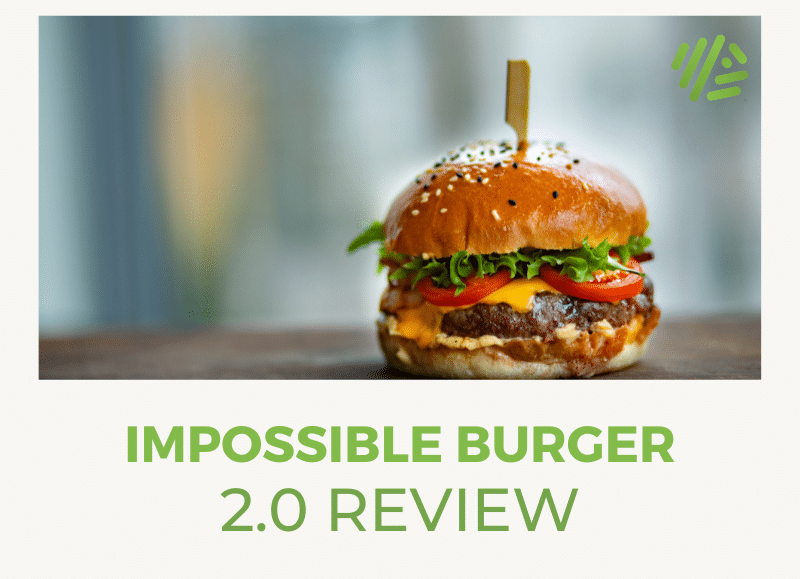Impossible Burger 2.0 Review

Contents
Update: the latest version of the Impossible Burger is now made gluten free without wheat, which is a welcome change. Thanks to our readers for bringing this to my attention.
The Impossible Burger is environmentally friendly, that much cannot be disputed. Raising cattle the way we do does real damage to our planet, and it has to stop, at least at its current trajectory. The industrial farming system is unsustainable, environmentally ruinous, and cruel to both animals and humans alike. Companies like Impossible Foods that create tasty plant based comfort food are badly needed.
However, Vegan junk food is an issue and just because it’s made of plants doesn’t mean it’s good for you.
Impossible burger designed to look like real burger
The Impossible Burger is designed to look and taste just like a real burger. This means the inventors were challenged to use plant matter to make a moist, “bloody” patty, with the same texture as real meat. To be fair, I must admit the Impossible Burger is reminiscent of a real burger, it has a texture and color that looks like ground beef. The aesthetic is impressive. The problem is that it uses ingredients that could be just as bad for some people’s health as eating a real burger every now and again.
In fact, there was some controversy as to whether the FDA would even approve the ingredient, called soy leghemoglobin, that makes the Impossible Burger “bleed.” Soy leghemoglobin releases a protein called heme which gives the burger it’s meat like traits.
Heme is not leghemoglobin
Is soy leghemoglobin safe? Very likely, yes.
The Impossible Burger team did feed unbelievable amounts of soy leghemoglobin to rats and found there were no adverse effects over a 28 day period.1
We don’t have studies in humans to see how people will react to the ingredients in the Impossible Burger.
It’s also worth noting that leghemoglobin, hemoglobin and myoglobin are not the same thing. They might all function to bind oxygen but they do all have a different structure. So, leghemoglobin is not the exact same molecule found in actual meat. They are similar but not identical.
Genetically modified microorganisms
According to this Wired Article, “one acre of soybeans yields just a kilogram of soy leghemoglobin,” so the Impossible Burger team created a workaround.
Wired does a good job of summing up the process:
Technicians take genes that code for the soy leghemoglobin protein and insert them into a species of yeast called Pichia pastoris. They then feed the modified yeast sugar and minerals, prompting it to grow and replicate and manufacture heme with a fraction of the footprint of field-grown soy.
And I do think this is an important distinction to make here. The Impossible Burger doesn’t just use genetically modified ingredients, it produces its key proteins using genetically modified microorganisms. I am not saying that is necessarily a bad thing, it may be a necessary thing in light of what animal agriculture is doing to the environment.
Impossible Burger Ingredients
Update: gluten is no longer an issue. The Impossible Burger 2.0 is now made without gluten.
Water, Soy Protein Concentrate, Coconut Oil, Sunflower Oil, Natural Flavors, 2 percent or less of: Potato Protein, Methylcellulose, Yeast Extract, Cultured Dextrose, Food Starch Modified, Soy Leghemoglobin, Salt, Soy Protein Isolate, Mixed Tocopherols (Vitamin E), Zinc Gluconate, Thiamine Hydrochloride (Vitamin B1), Sodium Ascorbate (Vitamin C), Niacin, Pyridoxine Hydrochloride (Vitamin B6), Riboflavin (Vitamin B2), Vitamin B12.




You should check out Actual Veggies, finally a burger that is made from real veggies and looks and tastes it too with no hidden ingredients. Also it’s refrigerated so you get a homemade style experience.
Some of these comments disparaging the Author on his credibility
lead me to think they are fake and he is hitting a nerve.
It is a credible article, thank you!
Bought a package from Costco and had 2 burgers prior with no problems.
Had another a week later and an hour later was at the toilet vomiting the contents from my stomach.
Thinking it could be something else , tried another 3 weeks later and like clockwork- an hour later ,my body rejected the consumption and I was vomiting the product all over again.
I haven’t vomited anything in 20 years and I am sure it is something in the burger that my body has an immune response and responds to get it out.
Twice, only twice I ate an Impossible burger and each time it caused me digestive problems.
The first time it caused me acid reflux for 3 days, the second time it caused me diarrhea.
That is why I just did a google search about it, and that is how I ended here reading this fascinating and informative article.
No wonder my digestive system cannot take it, those burgers can barely be called food!
I had an impossible burger yesterday from an upper scale restaurant , I was super excited to try out the plant based burger. It shredded my gut . I was sick for hours . Thank you for the explanation .
There’s a lot of speculation and grandiosity in this article. People go plant based for different reasons, that processed food is making people sick is not even at the top of the list of reasons. Impossible Meats mission statement is “to make the global food system truly sustainable by eliminating the need to make food from animals.” They are interested in reducing animal consumption, which benefits the environment and the animals. They also are honest about the fact that humans love meat – we freaking love it. By producing plant based foods that actually taste like meat, they want to get committed meat eaters to see that going plant based is a choice that they can enjoy. The plant based community has relied on social shaming and guilt tactics to try to convert meat eaters, which hasn’t been working. In fact, it does the opposite, it alienates people and makes them defend their choices. When only 5% of Americans consider themselves to be plant based, but 23% of Americans have tried eating plant based meats, it is clear that people want to make the ethical choice, but they want to also eat tasty food.
For me, the best tasting vegetarian/vegan options are foods that aren’t pretending to be meat or dairy. A mushroom should taste like a mushroom. Beans should taste like beans. But that doesn’t mean I don’t occasionally have a veggie burger to sate my cravings, and Impossible Meat is definitely the best pretender I’ve had.
While I appreciate the reminder that processed foods are less than ideal, I don’t have this expectation that people will eat Impossible Burgers several days a week, particularly at its current price point. Similarly, I don’t expect anyone to eat beef several days a week. This product is a nice alternative to and reduces my dependency on meat. So I’ll take the warnings with a grain a salt, just like meat eaters continue to eat meat despite the number of pandemics the industry has faced. There is no perfect solution nor do I think there ever will be. We can only moderate our consumption.
Maybe some retailer got stuck with excess stock, but the Grocery Outlet down the block was selling the two-patty, half-pound package for $1.25. That’s $5.00 a pound, which is pretty competitive with beef.
I tried two and had to throw the other two out. I unwittingly overcooked the first one, almost to the point of cardboard, and I didn’t think it was so bad. But I left the second one medium-rare, and the sight of the red juice must have triggered some kind of “uncanny valley” reaction. My brain must have told my stomach, “That’s not meat, you know, yet it bleeds,” and my stomach must have replied, “Yeah, I see… gross!” I could not swallow the bite.
I’m not vegan nor even vegetarian, but I don’t mind vegetarian dishes. I don’t think vegan meat is going to catch on. I think the meat industry will continue its non-sustainable ways, with the price of meat getting more and more expensive. We’re seeing that already. I remember distinctly buying hamburger for $1.65 a pound in 2008. Adjusted for twelve years of inflation, that would be $2.05 today, yet where can you buy a pound of ground meat for two bucks these days? Not even road kill is that cheap.
I have eaten the impossible burger i am not a vegetarian tho. So if you are and want to know what an omnivore thinks read on. The look, texture, weight, juice all look and feel fine/believable. The taste is similar to beef, however it is like buying the value brand cheap frozen beef patties that probably arn’t 100% beef anyways, that had some nice seasoning adding and cooking it to a med rare. Did it taste like a burger? Yes, but not a good one. There were some other issues too… It gave me a pretty bad bloat, within an hour or so, and then subsequent gas for a good day later. It was significant enough that I was unable to do my morning cardio the next day because of gas pain. I never get gas, and eat fresh fibrous foods on the reg. Should you try it? sure, why not… i mean just make sure you don’t have any long meetings the next day or a date later that night.
Thank you for this, many individuals are succumb to trends in this day and age and fail to properly research actual “processes” of many items they are consuming that eventually lead to many illnesses and diseases.
Thank you John so much for this detailed article. I as of late, have been incorporating plant base into my food regiment. I’ve had the impossible burger from Bare Burger and it seemed fine…I’ve had the morning star grillers and after having it twice, there’s something in it that makes my stomach feel a little nauseouseating. Being someone who recently been dealing with Acid Reflux (GERD) its like I’m so cautious…Changing in a good way for sure, gotten so much better, but still leary on what’s agreeable with my system and what’s hazardous…I definitely look forward to reading more of your articles in the future…Many Blessings
The 40 mystery proteins are a bit worrying. BSE(mad cow disease) is caused by a prion(a type of protein that lacks DNA). It can take years for symptoms to develop or be noticed when the prions that cause BSE are ingested. Who knows what kind of long term effects completely foreign novel mystery proteins may have over the years?